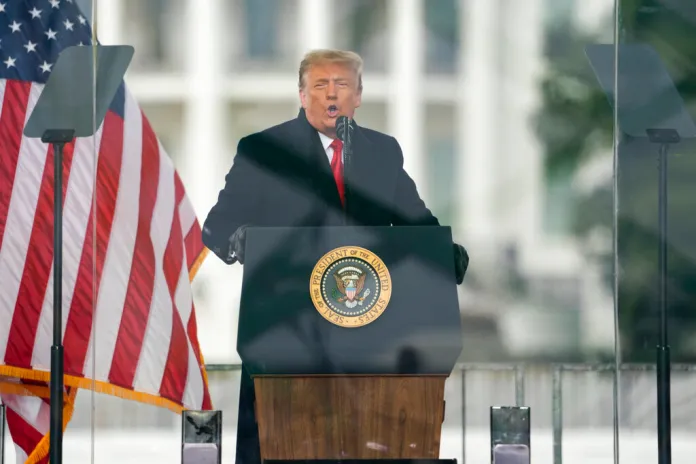Trump judges split over grouping deportation cases together or individually
Two federal judges in Texas, both appointed by former President Donald Trump, have delivered conflicting rulings regarding the ability of migrant detainees to challenge deportations collectively under the Alien Enemies Act. U.S. District Judge James Hendrix ruled against a request from three detainees seeking class action status,citing notable differences in their individual cases,which he deemed unsuitable for collective litigation. He emphasized that habeas corpus proceedings should remain individualized, following guidance from the Supreme Court. Conversely, U.S. district Judge Fernando Rodriguez granted class certification to a group of Venezuelan detainees, suggesting that addressing similar legal questions collectively would conserve judicial resources. Rodriguez also blocked the Trump governance’s enforcement of the deportation policy, asserting the lack of evidence for a coordinated threat from the alleged gang activity related to Venezuelan migrants.
This divergence among judges highlights the challenges faced by lower courts in managing coordinated legal disputes tied to the administration’s use of the Alien Enemies Act and points toward a significant rift in judicial interpretation. Legal experts suggest that the possibility of successful class actions is low due to the Supreme Court’s directives favoring individual filings. The debate surrounding these rulings is set to continue, with further appeals anticipated in higher courts, raising the likelihood of a significant legal confrontation in the future.
Trump judges split over grouping deportation cases together or handling individually
Two federal judges in Texas appointed by President Donald Trump have issued conflicting rulings on whether migrant detainees can band together to challenge deportations under the Alien Enemies Act, an early sign of legal turbulence facing the administration’s use of the wartime law.
In a ruling Friday, U.S. District Judge James Hendrix denied a request by three immigrant detainees in the Northern District of Texas to pursue their case as a class, finding their claims were too varied to be litigated collectively. The judge said the petitioners’ differences, including asylum status, gang allegations, and factual defenses, made group relief inappropriate under federal court rules.
“The petitioners bring many independent claims driven by individual circumstances,” Judge Hendrix wrote in a 48-page decision. “There will likely be no meaningful similarity among class members.”
The case is one of several winding through federal courts following the Supreme Court’s April 7 decision in Trump v. J.G.G., which dissolved a nationwide injunction blocking Trump’s March 14 proclamation to use the Alien Enemies Act to remove illegal immigrants from the country more efficiently. That order revived the AEA to expedite the removal of illegal migrants allegedly affiliated with violent transnational gangs, particularly Venezuela’s Tren de Aragua.
The Supreme Court emphasized that those migrants must be allowed to file habeas corpus petitions in the jurisdictions where they’re held, a ruling that has complicated efforts by plaintiffs to join large class action suits against the president’s proclamation and use of the 18th-century law.
In his latest order from Friday, Judge Hendrix relied heavily on the Supreme Court’s April 7 guidance, stating that habeas proceedings are inherently individualized and must be pursued separately. He also said that, even aside from procedural rules, he would deny class certification as a matter of judicial discretion.
“The Court today makes clear that cases in this Court will proceed as members of the Supreme Court suggested — individual habeas petitions filed in district courts,” he wrote.
The ruling contrasts sharply with a May 1 decision by U.S. District Judge Fernando Rodriguez Jr., also appointed by Trump, who granted class certification to a group of Venezuelan detainees in the Southern District of Texas. Rodriguez called the circumstances “unusual” and concluded that forcing courts to address the same legal questions repeatedly in hundreds of separate hearings would “unduly waste judicial resources.”
Rodriguez also became the first judge to block the Trump administration from enforcing its AEA deportation policy permanently, ruling that the March 14 proclamation invoking the law failed to meet the statutory threshold of an “invasion” or “predatory incursion.” The Trump administration claims that Tren de Aragua is acting at the behest of the Venezuelan government, but Rodriguez said the order lacked any evidence of such a coordinated threat.
“These issues hold true for any individual that respondents designate as an alien enemy under the AEA,” Rodriguez wrote. “A favorable result on any of these legal theories as to one individual will prove equally applicable to other Venezuelan aliens.”
The dissonance between how Hendrix and Rodriguez have handled these cases exposes an early and consequential rift among lower courts grappling with how or whether to allow coordinated legal challenges to the Trump administration’s use of the AEA.
Legal experts say the prospect of class certification in AEA litigation was already facing steep odds. Neama Rahmani, a former federal prosecutor, recently said that such efforts are “likely to face significant hurdles,” echoing a growing consensus among commentators that the Supreme Court’s insistence on individualized habeas filings effectively precludes collective challenges.
Justice Sonia Sotomayor, in her dissent in Trump v. J.G.G., was more blunt, warning that the majority’s opinion effectively “slams the door on a class action,” leaving detainees with fragmented and slower paths to relief.
Judge Hendrix’s decision in W.M.M. v. Trump appears to align with that thinking, highlighting the courts’ growing reluctance to authorize sweeping relief in cases involving national security-based deportations.
An added wrinkle arose on Friday with the announcement by White House deputy chief of staff Stephen Miller that the administration is looking into suspending habeas corpus to counter migrants’ efforts to challenge their deportations.
APPEALS COURT GRANTS TRUMP TEMPORARY WIN IN LAWSUIT OVER SECOND MAN DEPORTED TO SALVADORAN PRISON
“A lot of it depends on whether the courts do the right thing or not,” Miller told reporters outside the White House on Friday.
With further appeals likely on the way in both Texas cases, the litigation is likely headed for a high-stakes confrontation in the conservative-leaning 5th Circuit Court of Appeals, and possibly a return trip to the Supreme Court.
" Conservative News Daily does not always share or support the views and opinions expressed here; they are just those of the writer."




